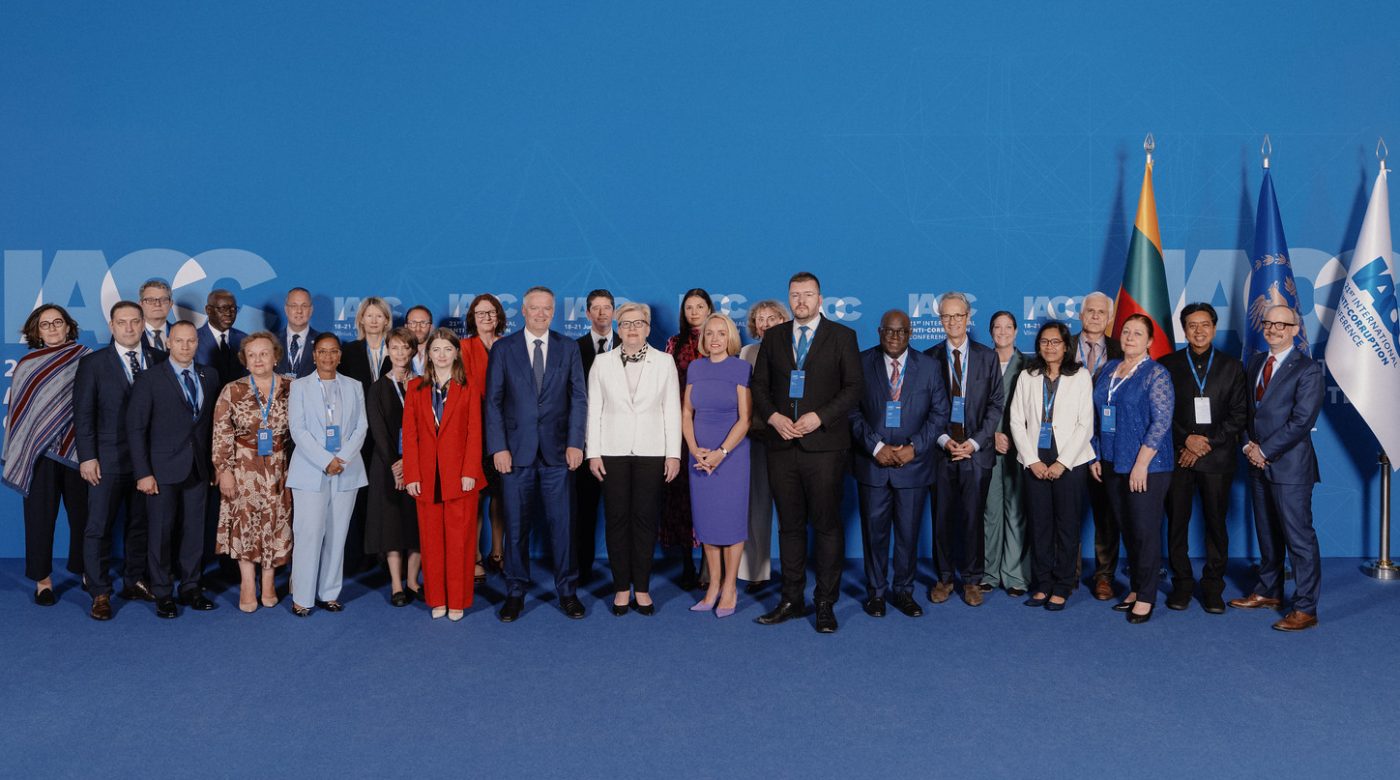-

The 3rd IACC High Level Segment

Vilnius, Lithuania
“Today… we are facing an increasing use of force and hybrid attacks in various areas, including information, cyberspace, energy, climate, and even food and migration. We are facing the use of corruption as a strategic tool by state and non-state actors.
… To tackle new criminal schemes, we need to be vigilant and ready to act swiftly and efficiently… Our efforts must be united not only internally, but also within the international community that shares our democratic values.
It is our collective responsibility to defend rules-based international order and to stand united.”
– Ingrida Šimonytė, Prime Minister of the Republic of Lithuania
“We must enhance regulatory frameworks, foster stronger international cooperation, and leverage technology… Engaging civil society, the media, and the private sector remains crucial, as does protecting civic space and promoting democratic resilience.”
– Gabija Grigaitė-Daugirdė, Vice-Minister of Justice of the Republic of Lithuania
The High-Level Segment of the 21st International Anti-Corruption Conference (IACC) in Vilnius, Lithuania, convened on June 19, 2024, under the theme “Confronting Global Threats: Standing up for Integrity.” This meeting brought together high-ranking government officials, leaders of international and regional organizations, civil society organizations and business representatives to address the pervasive issue of corruption that disrupts peace, impedes development, and compromises security. It reviewed recent developments, identified new challenges, and set shared priorities and actions for the next two years, reaffirming a collective commitment to transparency, accountability, and integrity. The meeting emphasized the crucial importance of collaborative efforts between governments, civil society, and the private sector in combating corruption and reinforcing the rules-based international order, democratic values, and human rights.
Corruption is a global challenge that also hinders the attainment of the Sustainable Development Goals (SDGs), weakens the rule of law, deteriorates public institutions, erodes trust, and exacerbates social and economic disparities. In today’s geopolitical climate, characterized by rising authoritarianism and hybrid threats, the menace of corruption is ever more pressing. Collaborative and comprehensive approaches are essential to effectively address corruption at local, national, and international levels.
Two years ago, participants of the High-Level Segment in Washington, D.C., USA, agreed on shared priorities for anti-corruption action to address impunity, enhance financial transparency, develop robust legal frameworks, link anti-corruption efforts with the promotion of democratic values, mainstream anti-corruption efforts across various sectors, and enhance international cooperation.
To date, challenges persist. The enforcement of anti-corruption measures remains uneven, and the need for greater political engagement and commitment at all levels remains evident.
The increased sophistication of corrupt practices requires continuous adaptation and innovative solutions. The landscape of corruption is evolving, with persistent challenges including the weaponization of corruption by authoritarian regimes and organized crime groups, escalating threats from kleptocracy, financial opacity, and the utilization of digital technologies in corrupt activities. The impact of corruption on global security is another pressing concern, as it weakens state institutions, fuels organized crime, and enables terrorist financing. Additionally, the concept of strategic corruption—where corruption is systematically used by state and non-state actors to achieve broader geopolitical or economic goals—has emerged as a significant threat to democracies worldwide.
While addressing these grand corruption issues, it is also imperative to tackle other pervasive forms of corruption that have both systemic and personal impacts. For instance, corruption related to climate action threatens environmental sustainability and climate goals, affecting humanity at large. On a more personal level, sextortion—coercion into sexual acts through abuse of power—remains underreported and unpunished, affecting individuals and necessitating targeted interventions and heightened awareness.
Effectively combating these challenges requires a comprehensive and multifaceted approach that addresses both broad and individual consequences. Innovative, adaptive responses, stronger international cooperation, and enhanced harmonized regulatory frameworks are necessary to counter the evolving tactics of corrupt actors, including professional enablers. Prevention is key in creating a culture of integrity, while robust enforcement is essential in upholding anti-corruption laws. Stronger efforts are needed across the board to implement effective anti-corruption measures that complement enforcement. A commitment to continuous adaptation and proactive measures is vital to maintaining the effectiveness of global anti-corruption efforts.
The High-Level Segment has identified shared priorities for the period of 2025/2026, focusing on strengthening global anti-corruption efforts:
The High-Level Segment of the 21st International Anti-Corruption Conference outlines the following recommendations to guide future actions in combating corruption. These recommendations aim to enhance the effectiveness of anti-corruption measures and ensure sustainable progress in promoting integrity and accountability.
These strategic recommendations aim to create a comprehensive and coordinated approach to combating corruption, ensuring that efforts are effective, sustainable, and inclusive. They should allow stakeholders to collaborate and foster a more transparent, accountable, and integrity-driven frameworks.
The High-Level Segment of the 21st International Anti-Corruption Conference reaffirms the collective commitment to advancing the global fight against corruption. The discussions highlighted the crucial importance of transparency, accountability, and integrity as foundational principles for sustainable development and democratic governance.
The High-Level Segment underscores the necessity of a unified and proactive approach to combating corruption. By working together across sectors and borders and leveraging the strengths of diverse stakeholders, the global community can build more resilient, transparent, accountable systems, and an integrity-driven future for all. The commitment to these efforts will contribute to progress towards reducing corruption, thereby supporting sustainable development, peace, and prosperity for all.
Participants in the 2024 High-Level Segment in Vilnius, Lithuania, included the following: